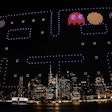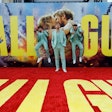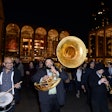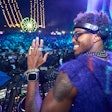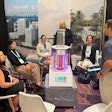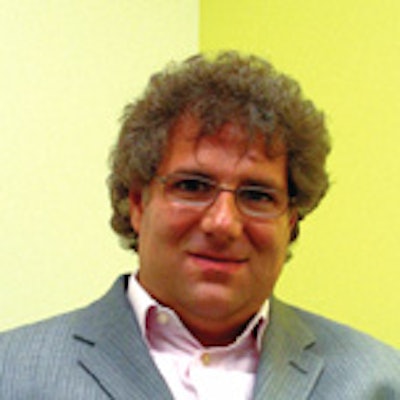
Matt Scheckner
Title: Executive Director, Advertising Week in NYC
What He Does: For the second year, the American Association of Advertising Agencies (AAAA) hired Scheckner and his team at Empire Sports & Entertainment to produce Advertising Week, a five-day advertising industry event. The schedule this year, from September 26 to 30, includes more than 200 events, including conferences, panel discussions, exhibits, concerts, and even a parade, at 50 venues throughout the city. Last year's inaugural event attracted more than 40,000 attendees and generated $55 million in visitor spending for New York.
Staff: Three full-time Empire staff members
Career Path: Scheckner graduated in 1986 from Emory University with degrees in political science and sociology. His first job out of college was as a policy analyst for the New York City Commission on the Year 2000, a panel appointed by Mayor Ed Koch to plot a course for the city's future. In November of 1987 he was appointed executive director of the New York City Sports Commission, where he wrote the winning bid for the 1998 Goodwill Games. He started Empire in 1994, which has produced events for Martha Stewart Omnimedia, the James Beard Foundation, SFX, and Mohegan Sun.
Age: 41
Biggest Job Challenge: "Balancing constituencies and interests. We've got the 33 members of the organizing committee, 52 nominated icons and slogans [for the advertising hall of fame], almost 40 corporate partners, a board of directors, and 50 venues. It's not like organizing a conference at the Marriott."
Favorite Hors D'oeuvres: Pigs in a blanket
What He's Reading: "I love anything about the Rat Pack. Right now I'm reading Sinatra: The Life by Anthony Summers."In many ways, the second year of an event is tougher than the first, because in the first year, no one knows what to expect. What are some of the things you changed this year?
We've changed the venue of the opening gala. It was at Gracie Mansion; now it's at the U.N., which speaks to advertising's role on the global front. That afternoon, we wanted something big and sexy and marquis, so we have Charlie Rose in what we call "Advertising Week's Global Conversation" with Maurice Levy, the chairman and
C.E.O. of Publicis, who is coming in from Paris.
The venue for the "Battle of Ad Bands" moved from Irving Plaza to the Supper Club. Advertising Week will always vary from year to year, and it will run the gamut of things from board of directors' lunches to home run, out-of-the-park events. This year we're producing a magazine celebrity editor panel discussion that features Susie Essman and Jon Stewart. They will interview Vanity Fair's Graydon Carter, Time's Jim Kelly, Cosmopolitan's Kate White, and Men's Health's David Zinczenko.
We added a Texas Hold 'Em poker night for advertising and media holding companies. Also new for this year is "Amateur Night at the Apollo," which has been going on since 1934, but what's unique is that all performers come from the advertising and media industry.
Also new this year is our partnership with Infinity Broadcasting. All our keynotes and panels will be podcast and streamed. There are more than 60 distinct keynotes and panel speakers; we had 32 last year.
One criticism of last year's event was that there were too many things going on at the same time and not enough time for attendees to attend as many things as they'd like. What are you doing to change that?
I am very pleased if the most severe criticism we get is that an individual can't go to all of the wonderful things we have. We can live with that. It was never imagined that any one person could go to everything. And the challenge people have is associating us with something they know—a convention or a conference. That's not really what we are. We're much bigger in scope, and the number of moving parts in quality and caliber of what we are putting together is bigger than anything that exists in any industry in this country.
What else has changed in this year's planning?
All the content will be out there earlier. The guide to the week this year drops two weeks before the event begins; last year, it came out the first day. That was a lesson learned. The official guide will be in Ad Age, AdWeek, MediaWeek, and BrandWeek. And the New York Times special section will be published on September 21, five days before.
Did last year's event make money for the AAAA? If not, do you expect to eventually profit from it?
The event did not make money on a pure cash basis. We raised more than $3 million in cash and barter, and we spent $1.7 million in cash. It was an investment year. There was no surprise, no loss. The AAAA made an investment in year one, and this year we're cash-positive.
—Hillary Chura
Posted 09.21.05
Title: Executive Director, Advertising Week in NYC
What He Does: For the second year, the American Association of Advertising Agencies (AAAA) hired Scheckner and his team at Empire Sports & Entertainment to produce Advertising Week, a five-day advertising industry event. The schedule this year, from September 26 to 30, includes more than 200 events, including conferences, panel discussions, exhibits, concerts, and even a parade, at 50 venues throughout the city. Last year's inaugural event attracted more than 40,000 attendees and generated $55 million in visitor spending for New York.
Staff: Three full-time Empire staff members
Career Path: Scheckner graduated in 1986 from Emory University with degrees in political science and sociology. His first job out of college was as a policy analyst for the New York City Commission on the Year 2000, a panel appointed by Mayor Ed Koch to plot a course for the city's future. In November of 1987 he was appointed executive director of the New York City Sports Commission, where he wrote the winning bid for the 1998 Goodwill Games. He started Empire in 1994, which has produced events for Martha Stewart Omnimedia, the James Beard Foundation, SFX, and Mohegan Sun.
Age: 41
Biggest Job Challenge: "Balancing constituencies and interests. We've got the 33 members of the organizing committee, 52 nominated icons and slogans [for the advertising hall of fame], almost 40 corporate partners, a board of directors, and 50 venues. It's not like organizing a conference at the Marriott."
Favorite Hors D'oeuvres: Pigs in a blanket
What He's Reading: "I love anything about the Rat Pack. Right now I'm reading Sinatra: The Life by Anthony Summers."In many ways, the second year of an event is tougher than the first, because in the first year, no one knows what to expect. What are some of the things you changed this year?
We've changed the venue of the opening gala. It was at Gracie Mansion; now it's at the U.N., which speaks to advertising's role on the global front. That afternoon, we wanted something big and sexy and marquis, so we have Charlie Rose in what we call "Advertising Week's Global Conversation" with Maurice Levy, the chairman and
C.E.O. of Publicis, who is coming in from Paris.
The venue for the "Battle of Ad Bands" moved from Irving Plaza to the Supper Club. Advertising Week will always vary from year to year, and it will run the gamut of things from board of directors' lunches to home run, out-of-the-park events. This year we're producing a magazine celebrity editor panel discussion that features Susie Essman and Jon Stewart. They will interview Vanity Fair's Graydon Carter, Time's Jim Kelly, Cosmopolitan's Kate White, and Men's Health's David Zinczenko.
We added a Texas Hold 'Em poker night for advertising and media holding companies. Also new for this year is "Amateur Night at the Apollo," which has been going on since 1934, but what's unique is that all performers come from the advertising and media industry.
Also new this year is our partnership with Infinity Broadcasting. All our keynotes and panels will be podcast and streamed. There are more than 60 distinct keynotes and panel speakers; we had 32 last year.
One criticism of last year's event was that there were too many things going on at the same time and not enough time for attendees to attend as many things as they'd like. What are you doing to change that?
I am very pleased if the most severe criticism we get is that an individual can't go to all of the wonderful things we have. We can live with that. It was never imagined that any one person could go to everything. And the challenge people have is associating us with something they know—a convention or a conference. That's not really what we are. We're much bigger in scope, and the number of moving parts in quality and caliber of what we are putting together is bigger than anything that exists in any industry in this country.
What else has changed in this year's planning?
All the content will be out there earlier. The guide to the week this year drops two weeks before the event begins; last year, it came out the first day. That was a lesson learned. The official guide will be in Ad Age, AdWeek, MediaWeek, and BrandWeek. And the New York Times special section will be published on September 21, five days before.
Did last year's event make money for the AAAA? If not, do you expect to eventually profit from it?
The event did not make money on a pure cash basis. We raised more than $3 million in cash and barter, and we spent $1.7 million in cash. It was an investment year. There was no surprise, no loss. The AAAA made an investment in year one, and this year we're cash-positive.
—Hillary Chura
Posted 09.21.05










